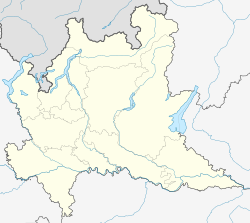Barbariga | |
|---|---|
| Comune di Barbariga | |
 View of Barbariga | |
| Coordinates: 45°24′N10°3′E / 45.400°N 10.050°E | |
| Country | Italy |
| Region | Lombardy |
| Province | Brescia |
| Frazioni | Frontignano |
| Area | |
• Total | 11.34 km2 (4.38 sq mi) |
| Elevation | 81 m (266 ft) |
| Population (2011) [2] | |
• Total | 2,440 |
| • Density | 220/km2 (560/sq mi) |
| Time zone | UTC+1 (CET) |
| • Summer (DST) | UTC+2 (CEST) |
| Postal code | 25030 |
| Dialing code | 030 |
| ISTAT code | 017011 |
| Patron saint | St. Vito |
| Saint day | 15 June |
| Website | Official website |
Barbariga is a comune in the province of Brescia, in Lombardy.


